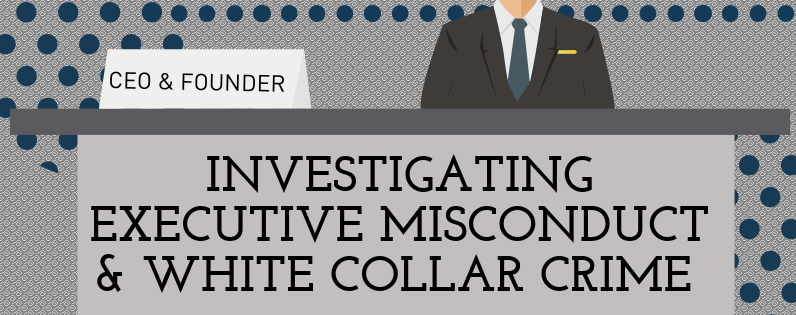Investigating Executives & White Collar Crime

Don’t let executive misconduct ruin your corporation… When it comes to running a business, the executives who are the visionaries and decision-makers that shape a company should always remain above reproach. White collar crimes have the potential to pull a business up from the root with devastating consequences. Unfortunately, Americans know from media coverage and […]
3 Most Common Types of Corporate Crisis
[et_pb_section fb_built=”1″ admin_label=”section” _builder_version=”3.22″][et_pb_row admin_label=”row” _builder_version=”3.25″ background_size=”initial” background_position=”top_left” background_repeat=”repeat”][et_pb_column type=”4_4″ _builder_version=”3.25″ custom_padding=”|||” custom_padding__hover=”|||”][et_pb_text admin_label=”Text” _builder_version=”4.6.5″ background_size=”initial” background_position=”top_left” background_repeat=”repeat” hover_enabled=”0″ ol_item_indent=”24px” sticky_enabled=”0″] What is a corporate crisis? While exact definitions may differ, a corporate crisis is generally defined as “an event, situation, or public initiative that threatens the company’s ability to effectively operate its business. A crisis can escalate into […]
Phishers Want Your Direct-Deposit
The invention of direct-deposit payments in electronic banking have likely saved companies millions of dollars over the years in labor hours, materials, and fees that previously caused problems for companies. However, in an age where your paycheck is sent automatically to your checking account, phishers are seeking to exploit this automation for personal gain. The […]
Investigating Employee Malingering

Investigating Non-Compete Violations
When growing a business, executives and owners have to go the extra mile when it comes to protecting trade secrets. In the pursuit of their company’s business, a common practice for corporations of all sizes is implementing non-compete clauses in their employees’ contracts. This ensures, should an employee leave the company for any reason, they […]
Private Investigators & Sexual Abuse Investigations
The growing awareness of sexual abuse in the media has the public on high alert in all walks of life—a steady stream of investigations into allegations of sexual misconduct within religious communities, sport teams and franchises, civil service, and the workplace to name a few. It seems like every week the news cycle is dominated […]
On the Line: Exposing Theft in Manufacturing

Investigating Employee Misconduct
Employee misconduct in the workplace can have a toxic effect on morale and productivity, which often incentivizes employers to resolve the situation quickly. These days, there are clear benefits to getting out in front of any misconduct complaint as movements like #MeToo have employers scrambling to vet their workforce so they can identify predators before […]
Nassar Case Exposes Culture of Abuse and Silence in USA Olympic Organizations
With sexual assault allegations dominating recent news cycles, Americans are further developing their figurative picture of what it’s like for a survivor of sexual assault to come forward with allegations against their abuser. When a survivor comes forward, they are subjected to scrutiny, libel/slander, and fierce criticism from private citizens like themselves about how […]
Tagged: Geosocial Investigations in 2018
Surveillance capitalism has multiplied the number of eyes on us at all times. Ubiquity of security cameras, traffic cameras, and cell phones with cameras have made it possible for law enforcement to track a suspect’s movements for entire city blocks. And that’s not counting the omnipresent eye of social media, where photo and geo tags […]